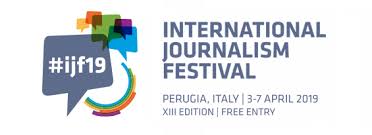3 – 7 April 2019
Country: Italy
 This year’s International Journalism Festival in Perugia, Italy hosted 650 speakers taking part in 280 sessions on topics ranging from creating deep fake videos to freedom of expression and the rise of populism.
This year’s International Journalism Festival in Perugia, Italy hosted 650 speakers taking part in 280 sessions on topics ranging from creating deep fake videos to freedom of expression and the rise of populism.

“Diversity” was a consistent theme across panels; here is a round-up of some of the most interesting conversations:
On a panel talking about the lack of female expert sources used in the news, media development director at WAN-IFRA Melanie Walker commented: “People want to see themselves reflected in the news that they read, in the content produced and the people they are seeing on screen, and this extends to expert sources.” Ros Atkins, from the BBC, and Jenny Holm, from Internews, discussed what their respective newsrooms were doing in order to tackle this issue, with the emphasis being on colleague engagement and participation.On a panel titled #UnbiasTheNews, industry professionals discussed the importance of diversity in the newsroom, and how it can save quality journalism. Freelance journalist Qian Sun shared her own experience: “As journalists, we need to reflect the community that we live in. If not, we fail as journalists, because an exclusively white newsroom lacks a certain perspective when looking at certain issues.” The panelists also discussed the issue of bias, and concluded that no journalist can ever be totally neutral. It is for this exact reason, they concluded, that diversity in the newsrooms is so important. “The starting point is to face our own bias, which makes diversity in the newsroom very important, because you look at the world on a wider spectrum,” shared Sun.
But how do we construct a diverse newsroom? This was a question explored by another panel, which looked at how to attract the right people to make newsrooms more diverse and sustainable. Alexandra Borchardt, director of leadership programmes at RISJ, shared that the key to attracting the right talent is to reach out to many different communities, and spend time on encouraging people from all backgrounds to explore a career in journalism. “You can’t wait for candidate to show up at the door”, she pointed out.
During a conversation about the polarised perception of Muslim women in the Western media, journalist and author Yasmin Alibhai-Brown explored the burden that can come with representation. As Muslim women, she and the other panelists described not wanting to be pigeonholed as ‘Muslim journalists,’ tasked only with covering ‘Muslim stories.’ It offered an important perspective in the discussion of newsroom diversity.
Migration and how to cover it in the media was a topic explored at a variety of talks. Tania Karas, managing editor at Refugees Deeply, questions what’s missing in migration reporting together with fellow journalist on the panel. On the subject of language, she shared:
“The trick is that when we are covering these policy stories, it is really important that we not lose sight of the people that we are talking about. It can be really easy to slip into the vocabulary of dehumanisation. You hear that a lot especially when government representatives are speaking. In the United States, they might use words like ‘illegal alien’. How much more dehumanising can you get by calling a person an illegal alien? We have to use words that remind our readers of these people’s humanity.”
These are just some of the many highlights from the International Journalism Festival. The event offered news perspectives and ideas, and on the topic of diversity in the media, proved that there is still work to be done. You can watch back all the International Journalism Festival panels on the event website
